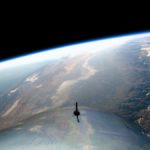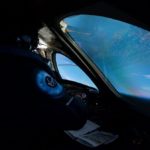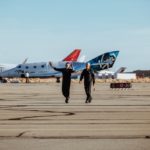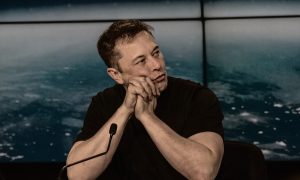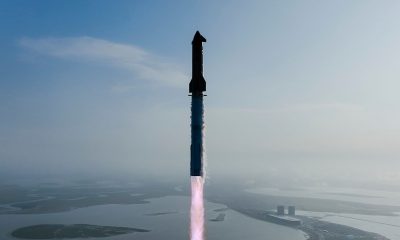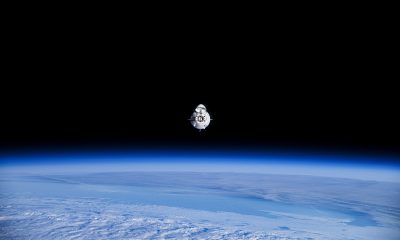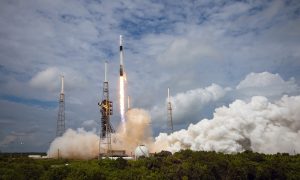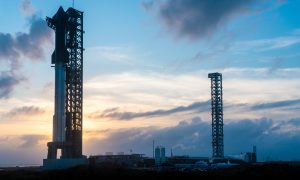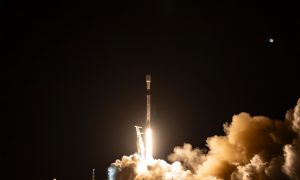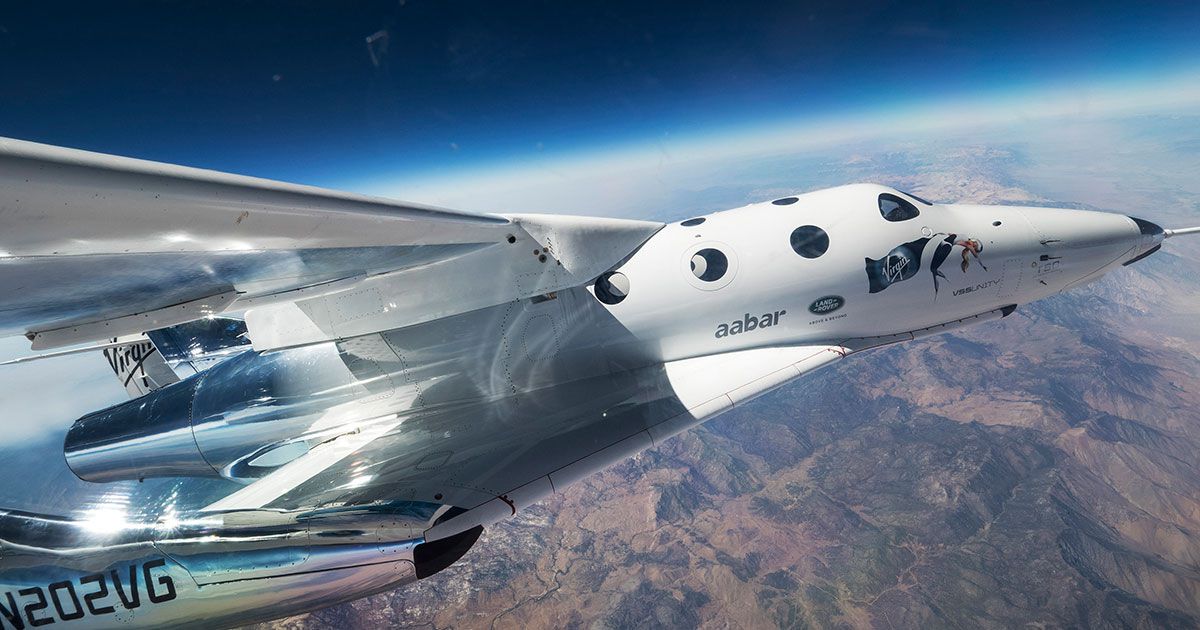

News
Virgin Galactic reaches space in rocket-powered plane, eyes space tourism in 2019
Virgin Galactic, the space tourism company founded by entrepreneur Richard Branson, has successfully made it to space for the first time with VSS Unity, their SpaceShipTwo-class rocket-powered plane, during the craft’s 4th test flight. This accomplishment makes Virgin the first US-based venture to carry humans to the edge of space since the Space Shuttle program ended in 2011, edging out others with similar goals such as SpaceX and Blue Origin. After taking off at 7:11 am this morning and detaching from WhiteKnightTwo, its custom airliner mothership, pilots Mark “Forger” Stucky and Rick “CJ” Sturckow reached a height 51.4 miles high in the craft to the edge of the stratosphere where they experienced weightlessness and the curvature of the Earth. This success brings the company one step closer to civilian tourist trips, something Branson hopes to achieve as early as 2019.
Our SpaceShipTwo traveling among the moon and stars 🌗 💫 🚀 pic.twitter.com/fDKdguHWoW
— Virgin Galactic (@virgingalactic) December 13, 2018
Unlike a traditional rocket which takes off from the ground, VSS Unity is flown to 43,000 feet underneath a specially designed airliner before being dropped and subsequently lighting up its rocket engines to power it vertically to an even higher altitude. After a 60-second engine burn speeds the craft to nearly three times the speed of sound, it continues its ascent, coasting until it reaches maximum altitude. A special “feather” system is then used for reentry, wherein the craft folds its wings and behaves like a traditional space capsule until the air thickens again, at which time the wings unfold again and behave like a space plane, gliding back to Earth and landing on a landing strip.
Becoming a passenger on one of VSS Unity’s future flights doesn’t come cheap, the price tag being $250,000 per 90-minute flight. However, given the 700 or so paid reservations, including several celebrities, it’s not the money that’s the challenge, it’s the technology. On October 31, 2014, Virgin suffered a crippling setback with the death of co-pilot Mike Alsubry and injury of pilot Peter Siebold when a predecessor craft crashed due to a combination of human error and an engineering flaw. The company received an abundance of criticism focused on whether the danger of space tourism made the rewards worthwhile, but after following recommendations set forth by the National Transportation Safety Board’s report on the incident along with further design and safety enhancements, they forged ahead to make today’s event a reality. Branson started Virgin Galactic in 2004.
- VSS Unity, a SpaceShipTwo-class space plane, takes in the view. | Credit: Virgin Galactic.
- VSS Unity, a SpaceShipTwo-class space plane, takes in the view. | Credit: Virgin Galactic.
- The pilots of VSS Unity, a SpaceShipTwo-class space plane, returning from their trip to space. | Credit: Virgin Galactic.
At 51.4 miles high, VSS Unity reached the technical definition of space, earning its pilots commercial astronaut wings by the US Federal Aviation Administration, although the usual international standard is the 62-mile “Karman line”. A typical NASA “sounding rocket”, a small rocket generally launched with equipment on board to take measurements and scientific experiments during an approximately 30-minute sub-orbital flight only, reaches anywhere from 30-80 miles above the Earth. That said, the lower altitude of VSS Unity also provides an opportunity for research, serving the dual-purpose of science and recreation. Four research payloads from NASA’s Flight Opportunities Program were on board its historic test flight as well as a test dummy, making the trip revenue-earning for the first time as well.
Virgin Galactic has more tests of VSS Unity planned before moving to Spaceport America in New Mexico where it will set up its tourism operation. Branson hopes to compete directly with Blue Origin, the rocket company founded by Amazon’s Jeff Bezos which also plans to ferry customers to space. Bezos’s venture will use a more traditional, reusable ground-based rocket, the New Shepard, that lands after returning from sub-orbit similar to SpaceX’s Falcon 9 first stages. Unlike Virgin, crewed flights and “pre-sales” have not yet been part of Blue Origin’s process, but plenty of information is available for potential customers on its website.
The parent company of Virgin Galactic (Virgin) has another space-based venture in its wings: Virgin Orbit. Using a system similar to NASA’s Pegasus rocket, a small rocket complete with payload will launch from a modified Boeing 747-400 airliner, the combo being called LauncherOne and Cosmic Girl, respectively. The company has its sights set on the small satellite industry, identifying a need that’s not currently being met by other launch providers, and its business model centers on proving low-cost access to space for existing companies, students, entrereneurs, and other types hoping to use space as part of their research or business endeavors.
Watch the below video clip for more on Virgin Galactic’s historic flight to space:
News
Tesla cleared in Canada EV rebate investigation
Tesla has been cleared in an investigation into the company’s staggering number of EV rebate claims in Canada in January.

Canadian officials have cleared Tesla following an investigation into a large number of claims submitted to the country’s electric vehicle (EV) rebates earlier this year.
Transport Canada has ruled that there was no evidence of fraud after Tesla submitted 8,653 EV rebate claims for the country’s Incentives for Zero-Emission Vehicles (iZEV) program, as detailed in a report on Friday from The Globe and Mail. Despite the huge number of claims, Canadian authorities have found that the figure represented vehicles that had been delivered prior to the submission deadline for the program.
According to Transport Minister Chrystia Freeland, the claims “were determined to legitimately represent cars sold before January 12,” which was the final day for OEMs to submit these claims before the government suspended the program.
Upon initial reporting of the Tesla claims submitted in January, it was estimated that they were valued at around $43 million. In March, Freeland and Transport Canada opened the investigation into Tesla, noting that they would be freezing the rebate payments until the claims were found to be valid.
READ MORE ON ELECTRIC VEHICLES: EVs getting cleaner more quickly than expected in Europe: study
Huw Williams, Canadian Automobile Dealers Association Public Affairs Director, accepted the results of the investigation, while also questioning how Tesla knew to submit the claims that weekend, just before the program ran out.
“I think there’s a larger question as to how Tesla knew to run those through on that weekend,” Williams said. “It doesn’t appear to me that we have an investigation into any communication between Transport Canada and Tesla, between officials who may have shared information inappropriately.”
Tesla sales have been down in Canada for the first half of this year, amidst turmoil between the country and the Trump administration’s tariffs. Although Elon Musk has since stepped back from his role with the administration, a number of companies and officials in Canada were calling for a boycott of Tesla’s vehicles earlier this year, due in part to his association with Trump.
News
Tesla Semis to get 18 new Megachargers at this PepsiCo plant
PepsiCo is set to add more Tesla Semi Megachargers, this time at a facility in North Carolina.

Tesla partner PepsiCo is set to build new Semi charging stations at one of its manufacturing sites, as revealed in new permitting plans shared this week.
On Friday, Tesla charging station scout MarcoRP shared plans on X for 18 Semi Megacharging stalls at PepsiCo’s facility in Charlotte, North Carolina, coming as the latest update plans for the company’s increasingly electrified fleet. The stalls are set to be built side by side, along with three Tesla Megapack grid-scale battery systems.
The plans also note the faster charging speeds for the chargers, which can charge the Class 8 Semi at speeds of up to 1MW. Tesla says that the speed can charge the Semi back to roughly 70 percent in around 30 minutes.
You can see the site plans for the PepsiCo North Carolina Megacharger below.

Credit: PepsiCo (via MarcoRPi1 on X)

Credit: PepsiCo (via MarcoRPi1 on X)
READ MORE ON THE TESLA SEMI: Tesla to build Semi Megacharger station in Southern California
PepsiCo’s Tesla Semi fleet, other Megachargers, and initial tests and deliveries
PepsiCo was the first external customer to take delivery of Tesla’s Semis back in 2023, starting with just an initial order of 15. Since then, the company has continued to expand the fleet, recently taking delivery of an additional 50 units in California. The PepsiCo fleet was up to around 86 units as of last year, according to statements from Semi Senior Manager Dan Priestley.
Additionally, the company has similar Megachargers at its facilities in Modesto, Sacramento, and Fresno, California, and Tesla also submitted plans for approval to build 12 new Megacharging stalls in Los Angeles County.
Over the past couple of years, Tesla has also been delivering the electric Class 8 units to a number of other companies for pilot programs, and Priestley shared some results from PepsiCo’s initial Semi tests last year. Notably, the executive spoke with a handful of PepsiCo workers who said they really liked the Semi and wouldn’t plan on going back to diesel trucks.
The company is also nearing completion of a higher-volume Semi plant at its Gigafactory in Nevada, which is expected to eventually have an annual production capacity of 50,000 Semi units.
Tesla executive teases plan to further electrify supply chain
News
Tesla sales soar in Norway with new Model Y leading the charge
Tesla recorded a 54% year-over-year jump in new vehicle registrations in June.

Tesla is seeing strong momentum in Norway, with sales of the new Model Y helping the company maintain dominance in one of the world’s most electric vehicle-friendly markets.
Model Y upgrades and consumer preferences
According to the Norwegian Road Federation (OFV), Tesla recorded a 54% year-over-year jump in new vehicle registrations in June. The Model Y led the charge, posting a 115% increase compared to the same period last year. Tesla Norway’s growth was even more notable in May, with sales surging a whopping 213%, as noted in a CNBC report.
Christina Bu, secretary general of the Norwegian EV Association (NEVA), stated that Tesla’s strong market performance was partly due to the updated Model Y, which is really just a good car, period.
“I think it just has to do with the fact that they deliver a car which has quite a lot of value for money and is what Norwegians need. What Norwegians need, a large luggage space, all wheel drive, and a tow hitch, high ground clearance as well. In addition, quite good digital solutions which people have gotten used to, and also a charging network,” she said.
Tesla in Europe
Tesla’s success in Norway is supported by long-standing government incentives for EV adoption, including exemptions from VAT, road toll discounts, and access to bus lanes. Public and home charging infrastructure is also widely available, making the EV ownership experience in the country very convenient.
Tesla’s performance in Europe is still a mixed bag, with markets like Germany and France still seeing declines in recent months. In areas such as Norway, Spain, and Portugal, however, Tesla’s new car registrations are rising. Spain’s sales rose 61% and Portugal’s sales rose 7% last month. This suggests that regional demand may be stabilizing or rebounding in pockets of Europe.
-

 Elon Musk2 weeks ago
Elon Musk2 weeks agoTesla investors will be shocked by Jim Cramer’s latest assessment
-

 Elon Musk2 days ago
Elon Musk2 days agoxAI launches Grok 4 with new $300/month SuperGrok Heavy subscription
-

 Elon Musk4 days ago
Elon Musk4 days agoElon Musk confirms Grok 4 launch on July 9 with livestream event
-

 News1 week ago
News1 week agoTesla Model 3 ranks as the safest new car in Europe for 2025, per Euro NCAP tests
-

 Elon Musk2 weeks ago
Elon Musk2 weeks agoA Tesla just delivered itself to a customer autonomously, Elon Musk confirms
-

 Elon Musk1 week ago
Elon Musk1 week agoxAI’s Memphis data center receives air permit despite community criticism
-

 News2 weeks ago
News2 weeks agoXiaomi CEO congratulates Tesla on first FSD delivery: “We have to continue learning!”
-

 Investor's Corner2 weeks ago
Investor's Corner2 weeks agoTesla gets $475 price target from Benchmark amid initial Robotaxi rollout

